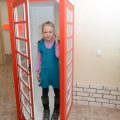№ 1. Mother's rest during pregnancy
Scientists from the University of California atSan Francisco recently became concerned with studying the stress level of expectant mothers and its connection with the health of the baby. 151 women took part in the experiment. Scientists observed their condition throughout the pregnancy and for another six months after. Particular attention was paid to the psychological state of expectant mothers. Specialists measured the stress level of women, conducting tests every week. During the study, they recorded what problems pregnant women face: with work, with health, with husbands and relatives. In general, they tried to cover all areas of women's lives. This was the first stage of the study. The second came when the babies were six months old. Doctors studied how children react to stressful situations, measuring their heartbeat. And it turned out that the children of those women who were exposed to the greatest stress during the second trimester of pregnancy react much more acutely to irritants than their counterparts - the children of women who were lucky enough to do without unnecessary nerves. It turns out that an increased level of stress in a mother can leave an imprint on the child's entire life. High reactivity is the culprit of frequent depressions and excessive anxiety, problems with behavior and socialization. And even physically such children are weaker - they recover from illnesses much longer. Photo: GettyImages
Photo: GettyImages
№ 2. Attention of the father
Dad's company, his love and support are needed andBoys and girls need their father as a role model. But in order for a son to want to follow his father's example, the latter must become his friend. You don't need to pounce on the child when he cries or force him to do "male" sports. The father himself should enjoy the time spent with his son; walks together or excursions are quite suitable for this. It is desirable that the father and son have common secrets. The girl will not imitate her father. But his approval is necessary for her self-confidence. Dad can praise her for a beautiful dress or hairstyle, and best of all - for something she made with her own hands. The girl learns to appreciate those qualities in her father that make him a real man, and then chooses a person who will be like her father as her life partner. Her family life will be largely determined by the relationship she had with her father in childhood.
No. 3. Evenings in front of the TV
Watching TV often and for a long time at allnot useful. It prevents the child from developing their own learning skills. When a child and mother watch movies or cartoons together, it is less useful than reading and playing together. According to , there should be no TV in the nursery at all. And it is better not to keep it in the kitchen either: watching TV while eating is bad for digestion. In general, the optimal place for the “best friend of the family” is in the living room. And it is really better to watch it together, so that you can discuss what you saw with your child later. Choose educational programs or those that teach something good - empathy, tolerance, good behavior, in the end. Photo: GettyImages
Photo: GettyImages
№ 4. Relations with peers
Children who are bullied by their peers oftensubsequently suffer from increased anxiety. In addition, they usually have a lower level of education and income. In a study conducted by doctors from a hospital in Boston, USA, it was found that fifth-graders who were constantly bullied by their classmates had the lowest rates of physical and emotional health by the time they reached senior grades. Therefore, it is very important for parents to be attentive and vigilant in looking for signs that their child is being bullied. Pay attention to every bruise, every abrasion, every cut, as well as reluctance to go to school. Teachers and parents should teach children not to remain silent if they are being bullied by their peers or see others being bullied. Only timely prevention of violence among children will help avoid serious problems in adulthood.
№ 5. Atmosphere in the family
When a child sees his dad beating his mom, the momyells at dad, and together they spank him, his sisters and brothers, but his entire pyramid of needs collapses. Let us remember that one of the basic needs is safety. If a child does not feel safe even at home, then outside of it he will also feel defenseless and helpless. Moreover, children often consider themselves guilty of the fact that their parents are not getting along with each other. Children who have experienced violence themselves or even just witnessed it very often develop problems in emotional, physical or cognitive development. 50 - 70 percent of children who have been exposed to domestic violence suffer from post-traumatic stress disorder, according to statistics from the MINCAVA Family Violence Nursing Curriculum. Depending on the age of the child, symptoms may include sleep disturbances, attention disorders, depressed mood, problems with school performance, self-harm. Research shows that children who have been exposed to domestic violence need psychological help five times more often than other peers.









